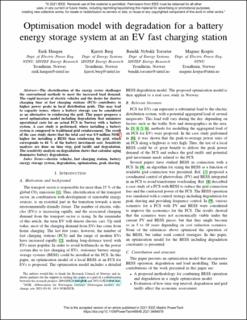Optimisation model with degradation for a battery energy storage system at an EV fast charging station
Chapter
Accepted version

Åpne
Permanent lenke
https://hdl.handle.net/11250/2826158Utgivelsesdato
2021Metadata
Vis full innførselSamlinger
- Institutt for elkraftteknikk [2465]
- Publikasjoner fra CRIStin - NTNU [38062]
Originalversjon
10.1109/PowerTech46648.2021.9494979Sammendrag
The electrification of the energy sector challenges the conventional methods to meet the increased load demand. The rapid increase of electric vehicles and the desire for shorter charging time at fast charging stations (FCS) contributes to higher power peaks in local distribution grids. This may lead to capacity issues, where a battery storage can be considered as an alternative to reinforcing the grid. This paper proposes a novel optimisation model including degradation that minimises operational costs for an actual FCS in Norway with a battery system. A case study is performed, where installing a battery system is compared to traditional grid reinforcement. The result of the case study shows that the total cost was 0.9 million NOK 1 higher for installing a BESS than reinforcing the grid, which corresponds to 44 % of the battery investment cost. Sensitivity analyses are done on time step, grid tariffs and degradation. The sensitivity analysis on degradation shows that calendar aging dominates battery degradation.